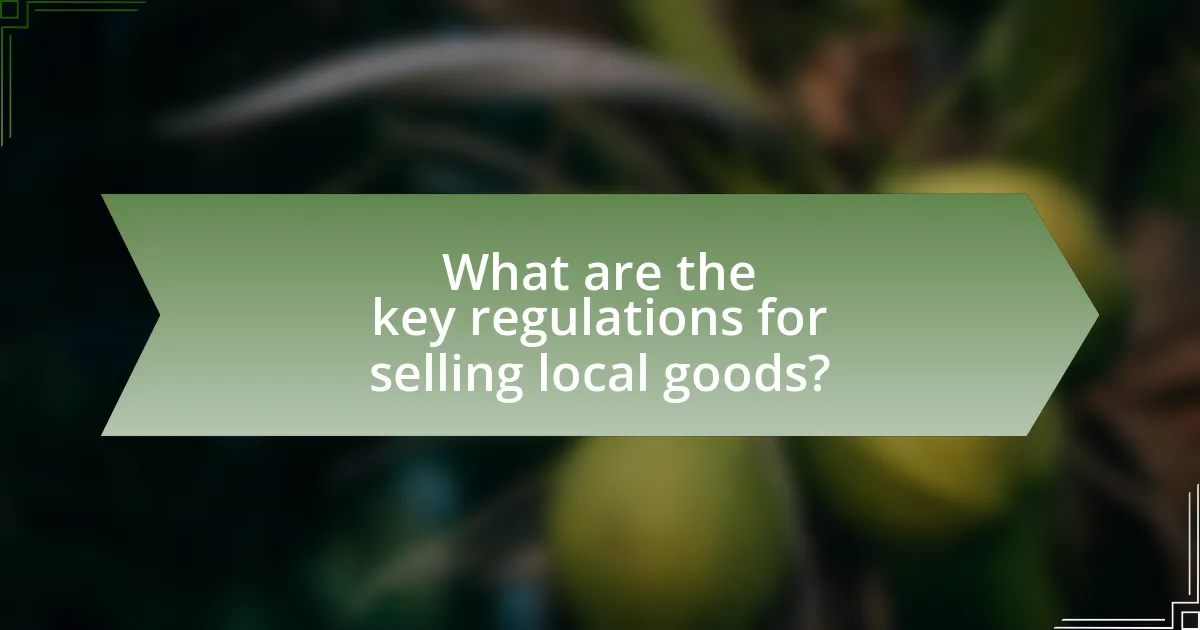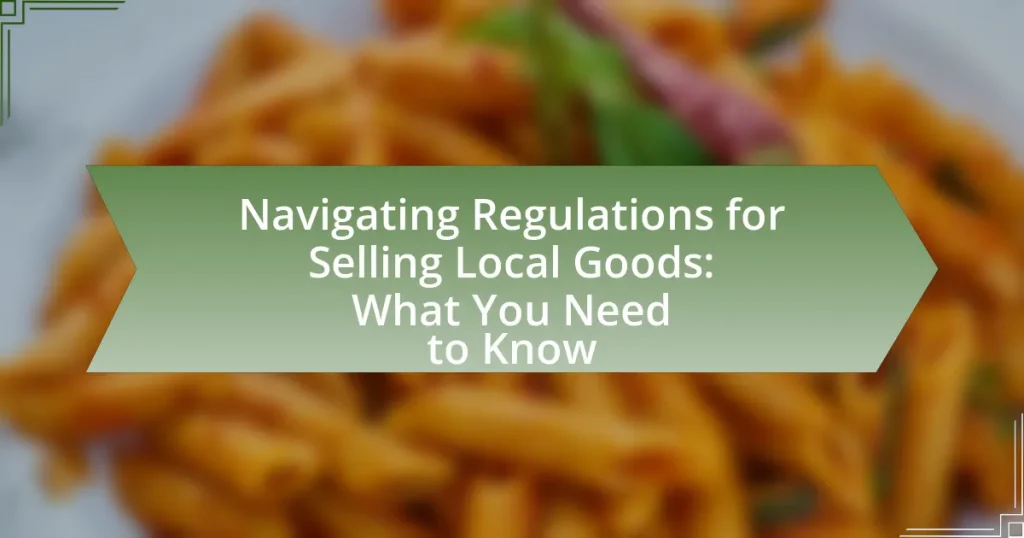The article focuses on the essential regulations for selling local goods, emphasizing compliance with health and safety standards, necessary permits, and labeling requirements. It outlines how local laws influence pricing, safety standards, and consumer rights, while detailing specific regulations sellers must be aware of, including zoning laws and tax obligations. The article also discusses the consequences of non-compliance, strategies for maintaining adherence to regulations, and resources available for understanding local laws. Additionally, it highlights best practices for sellers to ensure transparency and quality in their offerings, ultimately fostering trust and sustainability in the marketplace.

What are the key regulations for selling local goods?
Key regulations for selling local goods include compliance with local health and safety standards, obtaining necessary permits or licenses, and adhering to labeling requirements. Local health departments often mandate that food products meet specific safety guidelines to protect consumers. Additionally, sellers may need to secure business licenses from local authorities, which can vary by jurisdiction. Labeling regulations typically require clear information about ingredients, allergens, and nutritional facts, ensuring transparency for consumers. These regulations are enforced to promote public safety and fair trade practices within local markets.
How do local laws impact the sale of goods?
Local laws significantly impact the sale of goods by establishing regulations that govern pricing, labeling, safety standards, and consumer rights. These laws ensure that products meet specific quality and safety requirements, which can vary widely between jurisdictions. For example, the Consumer Product Safety Commission enforces regulations that mandate safety testing for certain goods, affecting how businesses operate and market their products. Additionally, local laws may impose taxes or tariffs that influence pricing strategies and overall market competitiveness. Compliance with these regulations is essential for businesses to avoid legal penalties and maintain consumer trust.
What specific local regulations should sellers be aware of?
Sellers should be aware of zoning laws, business licensing requirements, health and safety regulations, and tax obligations specific to their locality. Zoning laws dictate where certain types of businesses can operate, while business licenses are often required to legally sell goods. Health and safety regulations ensure that products meet safety standards, particularly for food items, and tax obligations include sales tax collection and remittance, which varies by jurisdiction. Compliance with these regulations is essential to avoid fines and legal issues, as local governments enforce these rules to protect consumers and maintain order in the marketplace.
How do zoning laws affect the sale of local goods?
Zoning laws significantly influence the sale of local goods by regulating where businesses can operate and what types of activities are permissible in specific areas. These laws can restrict the establishment of retail outlets in certain zones, thereby limiting the availability of local goods to consumers. For instance, residential zones may prohibit commercial sales, while commercial zones may have specific requirements for the types of goods sold, impacting local vendors’ ability to reach their target market. Additionally, zoning regulations can affect the size and layout of retail spaces, which can further influence the types of local goods that can be effectively sold.
What permits and licenses are required for selling local goods?
To sell local goods, you typically need a business license, a sales tax permit, and possibly health permits depending on the type of goods sold. A business license is required to legally operate a business in your locality, while a sales tax permit allows you to collect sales tax from customers. Health permits may be necessary for food-related products to ensure compliance with health regulations. These requirements can vary by state and municipality, so it is essential to check local regulations for specific licensing needs.
What types of permits are commonly needed?
Commonly needed permits for selling local goods include business licenses, sales tax permits, health permits, and zoning permits. Business licenses are required to legally operate a business, while sales tax permits allow for the collection of sales tax on transactions. Health permits are essential for food-related businesses to ensure compliance with health regulations, and zoning permits confirm that the business location adheres to local zoning laws. These permits are crucial for legal compliance and operational legitimacy in the marketplace.
How can sellers obtain the necessary licenses?
Sellers can obtain the necessary licenses by researching local regulations and applying through the appropriate government agencies. Each jurisdiction has specific requirements, which may include business licenses, sales tax permits, and health permits, depending on the type of goods sold. For example, in the United States, sellers typically need to visit their state or local government website to find the relevant application forms and guidelines. Additionally, some regions may require sellers to complete training or provide documentation to ensure compliance with local laws.
What are the consequences of not following regulations?
Not following regulations can lead to severe legal and financial consequences for businesses. Violations may result in fines, penalties, or even the suspension of business licenses, which can halt operations. For instance, the Small Business Administration reports that non-compliance with local health and safety regulations can incur fines ranging from hundreds to thousands of dollars, depending on the severity of the infraction. Additionally, businesses may face lawsuits from consumers or other entities, further compounding financial losses and damaging reputations.
What penalties can sellers face for non-compliance?
Sellers can face various penalties for non-compliance, including fines, legal action, and loss of business licenses. Regulatory agencies impose fines that can range from hundreds to thousands of dollars, depending on the severity of the violation. Legal action may result in lawsuits from consumers or competitors, leading to additional financial liabilities. Furthermore, non-compliance can lead to the revocation of business licenses, effectively halting operations. For instance, the Federal Trade Commission has enforced penalties against sellers for misleading advertising practices, demonstrating the serious consequences of failing to adhere to regulations.
How can sellers mitigate risks associated with regulatory violations?
Sellers can mitigate risks associated with regulatory violations by implementing comprehensive compliance programs that include regular training, monitoring, and audits. These programs ensure that sellers stay informed about relevant laws and regulations, such as consumer protection laws and product safety standards. For instance, a study by the Compliance, Governance and Oversight Council found that organizations with robust compliance programs reduced their risk of regulatory violations by up to 50%. By proactively addressing compliance, sellers can minimize potential legal penalties and enhance their reputation in the market.

How can sellers navigate the regulatory landscape effectively?
Sellers can navigate the regulatory landscape effectively by staying informed about local, state, and federal regulations that apply to their goods. This involves regularly reviewing updates from regulatory bodies, such as the Food and Drug Administration for food products or the Consumer Product Safety Commission for consumer goods. Additionally, sellers should engage with industry associations that provide resources and guidance on compliance. For instance, a study by the National Association of Manufacturers found that businesses that actively participate in industry groups are better equipped to understand and adapt to regulatory changes. By leveraging these resources and maintaining open communication with regulatory agencies, sellers can ensure compliance and mitigate risks associated with non-compliance.
What resources are available for understanding local regulations?
Local government websites serve as primary resources for understanding local regulations. These websites typically provide access to municipal codes, zoning laws, and licensing requirements specific to the area. Additionally, local chambers of commerce often offer guidance and resources for businesses, including workshops and informational sessions on compliance with local regulations. Furthermore, legal aid organizations may provide free or low-cost consultations to help individuals and businesses navigate regulatory frameworks.
Where can sellers find information on local laws?
Sellers can find information on local laws through government websites, legal databases, and local chambers of commerce. Government websites often provide comprehensive resources, including regulations specific to the area where the seller operates. Legal databases, such as Westlaw or LexisNexis, offer access to statutes and case law that pertain to local selling regulations. Additionally, local chambers of commerce can provide guidance and resources tailored to businesses in the community, ensuring sellers are informed about relevant laws and compliance requirements.
What role do local business associations play in regulatory guidance?
Local business associations provide essential regulatory guidance by acting as intermediaries between businesses and government entities. They help members understand and comply with local regulations, offering resources such as workshops, informational materials, and direct advocacy. For instance, the National Federation of Independent Business (NFIB) regularly updates its members on changes in legislation that affect small businesses, demonstrating the proactive role these associations play in ensuring compliance and promoting best practices.
How can sellers stay updated on regulatory changes?
Sellers can stay updated on regulatory changes by subscribing to industry newsletters and regulatory agency alerts. These resources provide timely information on new laws and amendments relevant to their business. For instance, the U.S. Small Business Administration and local chambers of commerce often distribute updates that can help sellers remain compliant. Additionally, attending industry conferences and workshops can offer insights into upcoming regulations and best practices for adaptation. Engaging with professional associations also facilitates networking with peers who share information about regulatory developments.
What strategies can be employed to monitor regulatory updates?
To monitor regulatory updates effectively, organizations can implement a combination of automated tracking systems, subscription services, and dedicated compliance teams. Automated tracking systems utilize software to scan government websites and regulatory bodies for changes in legislation, ensuring timely notifications. Subscription services, such as newsletters from legal firms or industry associations, provide curated updates directly to stakeholders. Additionally, establishing dedicated compliance teams allows for focused oversight and analysis of regulatory changes, ensuring that organizations remain informed and compliant. These strategies collectively enhance an organization’s ability to stay current with regulatory developments, which is crucial for maintaining compliance in the dynamic landscape of local goods sales.
How can networking help in understanding regulatory changes?
Networking facilitates the understanding of regulatory changes by providing access to diverse insights and experiences from industry peers and experts. Engaging with professionals in relevant fields allows individuals to share knowledge about recent updates, interpretations, and implications of regulations. For instance, attending industry conferences or joining professional associations can lead to discussions that clarify complex regulatory frameworks, enabling better compliance strategies. Additionally, networking can reveal best practices and case studies that illustrate how others have successfully navigated similar regulatory challenges, thereby enhancing one’s ability to adapt to changes effectively.

What best practices should sellers follow when selling local goods?
Sellers should prioritize transparency, quality, and compliance with local regulations when selling local goods. Transparency involves clearly communicating product origins, ingredients, and pricing to build trust with customers. Quality assurance is essential; sellers must ensure that their products meet safety and quality standards, which can be verified through local health department guidelines. Compliance with local regulations, such as obtaining necessary permits and adhering to zoning laws, is critical to avoid legal issues. According to the Small Business Administration, 20% of small businesses fail within the first year due to regulatory non-compliance, highlighting the importance of these best practices.
How can sellers ensure compliance with regulations?
Sellers can ensure compliance with regulations by thoroughly understanding and adhering to local, state, and federal laws relevant to their goods. This includes researching specific regulations that apply to their products, such as safety standards, labeling requirements, and tax obligations. For instance, the U.S. Small Business Administration emphasizes the importance of obtaining necessary licenses and permits, which vary by industry and location. Additionally, sellers should regularly review updates to regulations, as laws can change, impacting compliance requirements. Engaging with legal experts or compliance consultants can also provide valuable guidance to navigate complex regulatory landscapes effectively.
What steps should be taken to maintain compliance?
To maintain compliance when selling local goods, businesses should implement a systematic approach that includes understanding applicable regulations, obtaining necessary licenses, and conducting regular audits. First, businesses must identify and familiarize themselves with local, state, and federal regulations that govern their specific industry, as these laws can vary significantly. For instance, food sellers must comply with health and safety standards set by agencies like the FDA or local health departments.
Next, obtaining the required permits and licenses is crucial; this may include business licenses, sales tax permits, and health permits, depending on the nature of the goods sold. Regular audits should be conducted to ensure ongoing adherence to these regulations, which can help identify any compliance gaps before they lead to penalties.
Additionally, training employees on compliance requirements and maintaining accurate records of transactions and communications can further support compliance efforts. According to the Small Business Administration, businesses that proactively manage compliance are less likely to face legal issues and fines, reinforcing the importance of these steps.
How can sellers document their compliance efforts?
Sellers can document their compliance efforts by maintaining detailed records of all transactions, communications, and compliance-related activities. This includes keeping copies of permits, licenses, and certifications required for selling local goods, as well as documenting adherence to local regulations through checklists or compliance audits. Additionally, sellers should track any training sessions attended regarding regulatory requirements and retain evidence of compliance with safety and quality standards. This systematic documentation not only provides proof of compliance but also helps in identifying areas for improvement and ensuring ongoing adherence to regulations.
What common mistakes should sellers avoid?
Sellers should avoid underpricing their products, as this can lead to reduced profit margins and devalue the perceived quality of their goods. Setting prices too low may also attract price-sensitive customers who may not be loyal, ultimately harming long-term business sustainability. Additionally, failing to comply with local regulations can result in legal penalties and loss of credibility. For instance, not obtaining necessary permits or licenses can lead to fines or business shutdowns. Lastly, neglecting to understand the target market can result in ineffective marketing strategies, leading to poor sales performance. Research indicates that businesses that align their offerings with market demand see a 30% increase in sales compared to those that do not.
What are the pitfalls of ignoring local regulations?
Ignoring local regulations can lead to significant legal and financial repercussions. Businesses may face fines, penalties, or even closure if they operate outside the law. For instance, a study by the Small Business Administration found that 30% of small businesses fail due to non-compliance with regulations. Additionally, ignoring local zoning laws can result in costly litigation or the inability to obtain necessary permits, which can halt operations. Compliance with local regulations not only protects businesses from legal issues but also fosters trust within the community, enhancing reputation and customer loyalty.
How can sellers learn from others’ mistakes in regulatory compliance?
Sellers can learn from others’ mistakes in regulatory compliance by analyzing case studies of compliance failures and understanding the specific regulations that led to penalties. For instance, a study by the Government Accountability Office highlighted that businesses often face fines due to inadequate knowledge of local regulations, such as zoning laws or health codes. By reviewing these case studies, sellers can identify common pitfalls, such as failing to obtain necessary permits or misinterpreting compliance requirements. This proactive approach allows sellers to implement best practices and avoid similar errors, ultimately enhancing their compliance strategies and reducing the risk of legal issues.
What practical tips can help sellers succeed in navigating regulations?
Sellers can succeed in navigating regulations by staying informed about local laws, utilizing compliance resources, and engaging with industry associations. Staying informed involves regularly reviewing updates from government websites and legal advisories to understand changes in regulations that affect their business. Utilizing compliance resources, such as legal consultants or software tools designed for regulatory compliance, can streamline the process of adhering to laws. Engaging with industry associations provides sellers with networking opportunities and access to shared knowledge about best practices in compliance, which can enhance their understanding of regulatory landscapes.




